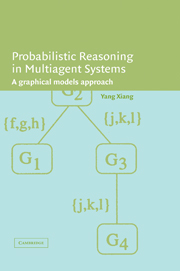Book contents
- Frontmatter
- Contents
- Preface
- 1 Introduction
- 2 Bayesian Networks
- 3 Belief Updating and Cluster Graphs
- 4 Junction Tree Representation
- 5 Belief Updating with Junction Trees
- 6 Multiply Sectioned Bayesian Networks
- 7 Linked Junction Forests
- 8 Distributed Multiagent Inference
- 9 Model Construction and Verification
- 10 Looking into the Future
- Bibliography
- Index
1 - Introduction
Published online by Cambridge University Press: 31 August 2009
- Frontmatter
- Contents
- Preface
- 1 Introduction
- 2 Bayesian Networks
- 3 Belief Updating and Cluster Graphs
- 4 Junction Tree Representation
- 5 Belief Updating with Junction Trees
- 6 Multiply Sectioned Bayesian Networks
- 7 Linked Junction Forests
- 8 Distributed Multiagent Inference
- 9 Model Construction and Verification
- 10 Looking into the Future
- Bibliography
- Index
Summary
Intelligent Agents
An intelligent agent is a computational or natural system that senses its environment and takes actions intelligently according to its goals. We focus on computational (versus natural) agents that act in the interests of their human principals. Such intelligent agents aid humans in making decisions. Intelligent agents can play several possible roles in the human decision process. They may play the roles of a consultant, an assistant, or a delegate. For simplicity, we will refer to intelligent agents as just agents.
When an agent acts as a consultant (Figure 1.1), it senses the environment but does not take actions directly. Instead, it tells the human principal what it thinks should be done. The final decision rests on the human principal. Many expert systems, such as medical expert systems (Teach and Shortliffe [75]), are used in this way. In one possible scenario, human doctors independently examine patients and arrive at their own opinions about the diseases in question. However, before the physicians finalize their diagnoses and treatments, the recommendations from expert systems are considered, possibly causing the doctors to revise their original opinions. Intelligent agents are used as consultants when the decision process can be conducted properly by humans with satisfactory results, the consequences of a bad decision are serious, and agent performance is comparable to that of humans but the agents have not been accorded high degrees of trust.
- Type
- Chapter
- Information
- Probabilistic Reasoning in Multiagent SystemsA Graphical Models Approach, pp. 1 - 15Publisher: Cambridge University PressPrint publication year: 2002

